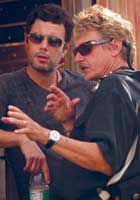Local writer Teresa Bruce dishes with Mark Shaffer about her BIFF-nominated screenplay The Scarlet Registry
 Synopsis: A cruise ship dancer who can’t even figure out that sandbags don’t work without sand is accused of molesting his teenage daughter. But when he’s listed on the Internet Sex Offender Registry, Zack isn’t the only one forced to wear the modern-day Scarlet Letter – his wife and children suffer just as much. On the eve of a hurricane, Zack protects his family first, then makes a suicidal run for freedom – finding redemption in anonymity.
Synopsis: A cruise ship dancer who can’t even figure out that sandbags don’t work without sand is accused of molesting his teenage daughter. But when he’s listed on the Internet Sex Offender Registry, Zack isn’t the only one forced to wear the modern-day Scarlet Letter – his wife and children suffer just as much. On the eve of a hurricane, Zack protects his family first, then makes a suicidal run for freedom – finding redemption in anonymity.
Lowcountry locals may remember Teresa Bruce as an anchor and reporter at WJWJ TV. This is her second stop in Beaufort on a journey best explained by the writer on her website:
I live and write in Beaufort, South Carolina from an old teak desk that overlooks the Intracoastal Waterway. My writing career began with documentaries that aired on PBS – I’m most proud of “God’s Gonna Trouble The Water” narrated by Ruby Dee.
When I left Beaufort to run the broadcast division of Ogilvy Public Relations Worldwide, the writer I most admire signed a photograph for me with these words: “I hope your period of exile from Beaufort is not long Teresa – much love, Pat Conroy.”
My exile from Beaufort turned into a filmmaking sojourn – until I gave it all up to spend a year retracing my nomadic childhood through Latin America.
She eventually returned to Beaufort with her husband and collaborator, the photographer Gary Geboy. Last year she was a first time finalist in the BIFF screenplay competition. She didn’t win, but she did something that epitomizes the festival experience: she got a writing gig out of it.
Teresa Bruce: I met Brad Glass, a director with a film called Florida Road in the Features Finals. I’d lived for a while in South Africa where his film was set and where he lives part time. After his showing I walked up and started a conversation. He knew I had a screenplay in the competition, and like all directors he was talking about his next project and mentioned he was having trouble with the script and wondered if I would be interested in looking at it. I thought it was just one of those things you say at a cocktail party and I said, “Sure, sure.” I didn’t see him again and then that Monday morning when he got back to L.A. he called.
Mark Shaffer: This is a holy crap moment. (Laughter) It’s put up or shut up time.
TB: Exactly! It was Oh, now I may have to do something. Well, I had to think about it. I didn’t know this person. I didn’t know much about [the project]. But it turned out to be three or four months of work. He had an original script that he wanted to burn down and start over with the same idea. So, I had to make a decision based on meeting him at BIFF.
MS: You rolled the dice.
TB: What did I have to lose? I’m just starting out in this genre and the fact that I connected with him in an environment like BIFF and had an actual conversation on a human to human level made all the difference in the world. I was able to say, “I’ll give this guy a shot.” And it turned out to be a great experience. He’s not a Hollywood director. He’s not full of mumbo jumbo. He just wanted his story told in a better way. It was also a totally different process than writing my own stuff – it’s not my story – it’s nothing I would have even dreamed up. I just had to listen and figure out what he was trying to get across and then make the story come alive and the characters real.
I imagine this is 90% of screenwriting in the real world, getting an assignment to write something. I figured if I can master this it’s another skill to have going forward. I had three or four different drafts and now he’s casting it.
MS: The script’s finished?
TB: It’s finished. He’s learned from film festival experience that he needs at least one big star to hang the film on so he’s looking at actors, putting the financing together and hopes to start shooting later this year in Cape Town, South Africa.
MS: Any chance that might mean you’d be on the set?
TB: I hope so. He wants me there. I’d love to see it all happen and I don’t know how he does it. He made a film for a million dollars last year that looked like a heck of a lot more. That part of it is a mystery to me. Keep your fingers crossed.
MS: They’re crossed. Let’s talk about this year’s entry. Did you take a different approach?
TB: Last year’s entry was a very personal drama and this one’s a very intense drama, as well. It was only after I entered it that I realized these things aren’t that marketable which makes me appreciate just how lucky we are to have a film festival as a venue for the more experimental stuff. It’s not Toy Story 3. It’s not feel good. So I’m really grateful that BIFF exists as an outlet for those things. Now, would I like to see it made into a film? Of course. Realistically though, not until I’ve made a few Toy Story 3’s. (Laughs)
MS: Well, good luck on those.
TB: You know what I mean. You have to have that kind of backing behind you to do a dream project like this that’s dark and controversial.
MS: No one will ever tell James Cameron what or how to write ever again.
TB: Right. But these are the films I like to see, so these are the films I want to write.
MS: Where did this one come from?
TB: Over the years I’ve met different men whose lives have been utterly, inalterably ruined because of false accusations. With the advent of the national sex offender registry, if you’re falsely accused your life is literally over for twenty years.
I started researching and finding lots of horror stories. The more I found out about it the more I realized that it’s based on good intentions, but there is a problem that needs to be addressed. The law is so broad and so poorly executed and paints everyone with the same brush that it ends up being deeply flawed and often causes innocent lives to be ruined. Kind of like if you get mistaken for a terrorist and end up on the No Fly List.
MS: You actually took this out to Los Angeles for PitchFest, which is the speed dating equivalent of selling your script.
TB: It’s on The Tonight Show every year. I’d seen it before and always thought, those crazy people! Why would they ever go on national TV and say those stupid things? And there I was. But I didn’t volunteer to go on. Again, the topic’s a little bleak.
MS: Too bad. It was practically a guarantee. What was the experience like?
TB: It’s in this huge dungeon-like hotel basement and they had about thirty-two little quaint round tables – as if it might be a Parisian café. You’re assigned numerically and put in a holding pen to wait your turn and then every step is timed. You have thirty seconds to get to your table then a buzzer sounds and you have exactly five minutes. It’s pretty intense. People were throwing up in the holding room. (Laughter) Yeah. It was quite an experience.
MS: You have to overhear some of these things. What was being pitched?
TB: A lot of vampire sex movies, a lot of road-trip-buddy/vampire movies. Vampires were big.
MS: Something new for the screenwriters this year at BIFF is a “table read” with actors actually doing scenes from scripts.
TB: They let us pick the scene and the actors will do this on stage after the screenings are finished the first night (February 17). For me this is exciting – to hear how my dialogue actually works. If it can stand on it’s own I’ll know that it’s working.
MS: And sitting there with the rest of us hearing it for the first time.
TB: I’ll either be cringing or grinning. We’ll see. There are so very few film festivals that do anything for the screenwriters. This sets BIFF apart. If the goal is to get filmmakers to come here and make movies about the place, what a great way to do it. [BIFF Executive Director] Ron Tucker doesn’t care about big celebrities and all the glitz, he just wants to get films made and the people who live here to be able to follow their passions and see their dreams come to life on the screen. What could be better?
Find Teresa Bruce online at www.teresabrucebooks.com
and get film festival updates on our FilmFix Blog. Mark Shaffer’s email is backyardtourist@gmail.com







